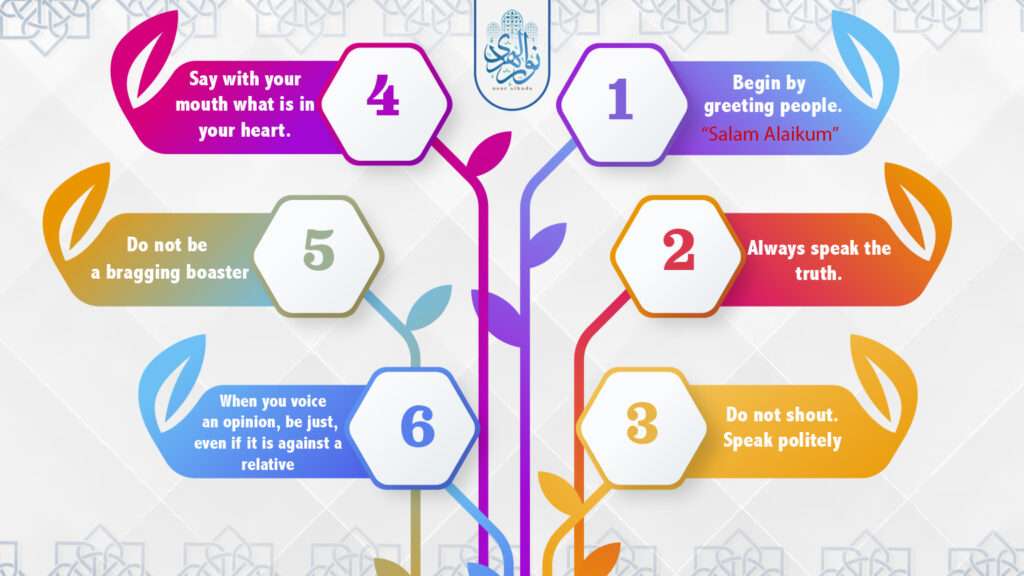The etiquettes of Speaking in Islam

Etiquette, manners, and proper conduct hold significant importance in Islam, encompassing various aspects of a Muslim’s life. One crucial area where these principles apply is in the way Muslims speak and communicate. The Qur’an and Hadith provide profound insights into the etiquettes of speech, emphasizing the use of kind words, respectful tones, and mindful communication. This article explores the etiquettes of speaking in Islam through the lens of relevant Arabic Qur’anic verses and Hadith, shedding light on the divine guidance that shapes a believer’s verbal interactions.
The Power of Words
The Quran emphasizes the profound impact of words, highlighting that speech is a potent tool with lasting consequences. Surah Al-Isra (17:53) reminds believers that their words will be taken into account on the Day of Judgment:
“And tell My servants to say that which is best. Indeed, Satan induces [dissension] among them. Indeed Satan is ever, to mankind, a clear enemy.”
Speaking Gently and Respectfully
The Hadith literature is rich with examples of Prophet Muhammad (peace be upon him) exemplifying the etiquette of speaking. A well-known Hadith in Sahih Bukhari and Sahih Muslim narrates that the Prophet said,
“Whoever believes in Allah and the Last Day, let him speak goodness or remain silent.”
This teaching encourages believers to engage in constructive speech or choose silence when unsure of the impact of their words.
Avoiding Backbiting and Slander
The Quran sternly warns against backbiting and slander, emphasizing the gravity of such actions.
“O you who have believed, let not a people ridicule [another] people; perhaps they may be better than them; nor let women ridicule [other] women; perhaps they may be better than them.”
Surah Al-Hujurat:11
Prophet Muhammad reinforced this teaching by stating in Sahih Muslim,
“Do you know what backbiting is?” The Companions replied, “Allah and His Messenger know best.” He said, “To mention about your brother what he dislikes.”
Truthfulness and Honesty
The Quran underscores the importance of truthfulness and honesty in speech. Surah Al-Baqarah (2:42) admonishes believers to uphold truth even in difficult circumstances:
“And do not mix the truth with falsehood or conceal the truth while you know [it].”
Prophet Muhammad emphasized honesty, saying in Sahih Muslim,
“Be truthful, for indeed truthfulness leads to righteousness, and indeed righteousness leads to Paradise.”
Patience and Forbearance in Communication
The Quran advises believers to exercise patience and forbearance in the face of challenging interactions. Surah Al-Furqan (25:63) teaches:
“And the servants of the Most Merciful are those who walk upon the earth in humility, and when the ignorant address them, they say [words of] peace.”
This exemplifies the importance of responding to ignorance with grace and peace.
Softening Hearts with Beautiful Words
The Quran encourages the use of kind and beautiful words to soften hearts and promote harmony. Surah Ya-Sin (36:70) describes the messengers of Allah with the words: “Peace” – a word from a Merciful Lord. This highlights the importance of greeting with peace and using gentle language to convey messages. Prophet Muhammad further emphasized this in a Hadith where he said, “A good word is charity.”
Seeking Knowledge and Giving Sound Advice
Islam places a high value on seeking knowledge and sharing it for the benefit of others. Surah Al-Mujadila (58:11) stresses the importance of seeking knowledge:
“…and know that Allah knows what is within your souls, so beware of Him. And know that Allah is Forgiving and Forbearing.”
The Prophet’s Hadith emphasizes the duty of giving sound advice, “Religion is sincerity.” When asked to whom, he replied, “To Allah, His Book, His Messenger, and to the leaders of the Muslims and their common folk.”
Supplicating and Remembering Allah
The Quran encourages believers to remember Allah and supplicate with humility and sincerity. Surah Al-A’raf (7:205) reminds believers to call upon Allah in the best way:
“And remember your Lord within yourself in humility and in fear without being apparent in speech, in the mornings and the evenings. And do not be among the heedless.”
Prophet Muhammad taught various supplications and the importance of remembering Allah in everyday interactions.
Resolving Conflicts with Wisdom
The Quran emphasizes resolving conflicts with wisdom and understanding. Surah Al-Nisa (4:35) advises believers on how to deal with disputes:
“And if you fear dissension between the two, send an arbitrator from his people and an arbitrator from her people. If they both desire reconciliation, Allah will cause it between them. Indeed, Allah is ever Knowing and Acquainted [with all things].”
The Prophet’s Hadith also guides believers on conflict resolution, stating,
“Shall I inform you about something which is better than the rank of fasting, prayer, and charity? Making peace between people: creating goodwill between them; for enmity and bad feeling destroy mankind.”
Gratitude and Positive Speech
Gratitude is a fundamental aspect of Islamic teachings. The Quran emphasizes expressing gratitude through positive speech and acknowledging Allah’s blessings. Surah Ibrahim (14:7) highlights this:
“And [remember] when your Lord proclaimed: ‘If you give thanks [by accepting faith and worship], I will give you more; but if you are thankless, verily My punishment is indeed severe.'”
Conclusion
The etiquettes of speaking in Islam, guided by the Quran and Hadith, emphasize the importance of using kind, respectful, and honest words, while avoiding harmful speech such as backbiting and slander. Through the teachings of Prophet Muhammad and the divine guidance of the Quran, Muslims are reminded to communicate with mindfulness, patience, and a commitment to truth. By adhering to these principles, believers can enhance their relationships, contribute positively to society, and earn the pleasure of Allah in both their verbal interactions and their overall conduct.
The etiquettes of speaking in Islam, as outlined in the Quran and Hadith, encompass a wide range of virtues including kindness, honesty, humility, patience, and wisdom. By adhering to these etiquettes, Muslims can foster healthier relationships, create positive environments, and enhance their own spiritual growth. The guidance from the Quran and the example of Prophet Muhammad provide a comprehensive framework for believers to communicate effectively, cultivate meaningful connections, and ultimately strive to attain Allah’s pleasure in their speech and conduct.
